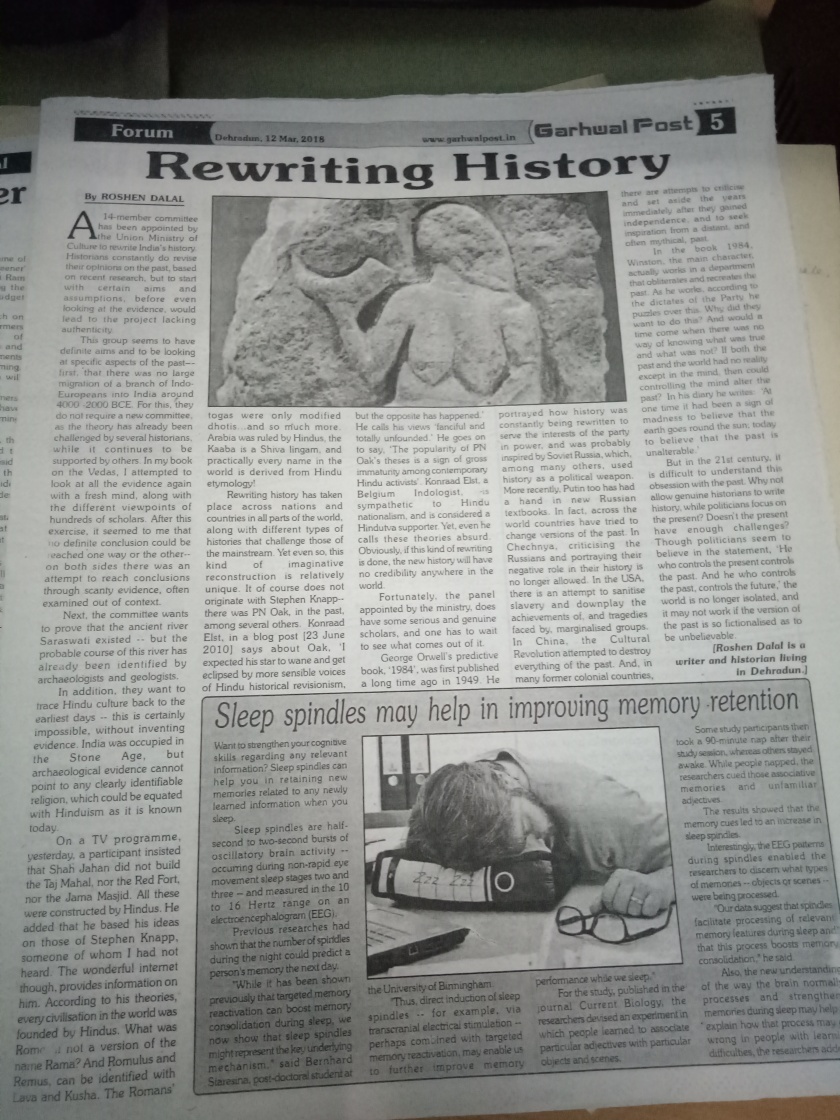I wrote this article after listening to a rather bizarre discussion on TV, published in today’s Garhwal Post–the word file is below.

Rewriting history
A 14- member committee has been appointed by the Ministry of Culture in India, to rewrite India’s history. Historians constantly do revise their opinions on the past, based on recent research, but to start with certain aims and assumptions, before even looking at the evidence, would lead to the project lacking authenticity.
This group seems to have definite aims and to be looking at specific aspects of the past–firstly that there was no large migration of a branch of Indo-Europeans into India around 4000 -2000 BCE. For this, they do not require a new committee, as the theory has already been challenged by several historians, while it continues to be supported by others. In my book on the Vedas, I attempted to look at all the evidence again with a fresh mind, along with the different viewpoints of hundreds of scholars. After this exercise, it seemed to me that no definite conclusion could be reached one way or the other–on both sides there was an attempt to reach conclusions through scanty evidence, often examined out of context.
Next, the committee wants to prove that the ancient river Sarasvati existed–but the probable course of this river has already been identified by archaeologists and geologists.
In addition, they want to trace Hindu culture back to the earliest days–this is certainly impossible, without inventing evidence. India was occupied in the Stone Age, but archaeological evidence cannot point to any clearly identifiable religion, which could be equated with Hinduism as it is known today.
On a TV programme yesterday, a participant insisted that Shah Jahan did not build the Taj Mahal, nor the Red Fort, nor the Jama Masjid. All these were constructed by Hindus. He added that he based his ideas on those of Stephen Knapp, someone of whom I had not heard. The wonderful internet though, provides information on him. According to his theories, every civilisation in the world was founded by Hindus. What was Rome, if not a version of the name Rama? And Romulus and Remus, can be identified with Lava and Kusha. The Romans’ togas were only modified dhotis…and so much more. Arabia was ruled by Hindus, the Kaaba is a Shiva lingam, and practically every name in the world is derived from a Hindu etymology!
Rewriting history has taken place across nations and countries in all parts of the world, along with different types of histories that challenge those of the mainstream. Yet even so, this kind of imaginative reconstruction is relatively unique. It of course does not originate with Stephen Knapp–there was P N Oak, in the past, among several others. Konraad Elst, an a blog post [23 June 2010] says about Oak, ‘I expected his star to wane and get eclipsed by more sensible voices of Hindu historical revisionism, but the opposite has happened.’ He calls his views ‘fanciful and totally unfounded.’ He goes on to say, ‘The popularity of P N Oak’s theses is a sign of gross immaturity among contemporary Hindu activists’. Konraad Elst, a Belgium Indologist, is sympathetic to Hindu nationalism, and is considered a Hindutva supporter. Yet even he, calls these theories absurd. Obviously, if this kind of rewriting is done, the new history wil have no credibility anywhere in the world.
Fortunately, the panel appointed by the ministry, does have some serious and genuine scholars, and one has to wait to see what comes out of it.
George Orwell’s predictive book 1984, was first published a long time ago in 1949. He portrayed how history was constantly being rewritten to serve the interests of the party in power, and was probably inspired by Soviet Russia, which, among many others, used history as a political weapon. More recently, Putin too has had a hand in new Russian textbooks. In fact, across the world countries have tried to change versions of the past. In Chechnya, criticizing the Russians and portraying their negative role in their history is no longer allowed. In the USA there is an attempt to sanitize slavery and downplay the achievements of, and tragedies faced by, marginalized groups. In China, the Cultural Revolution attempted to destroy everything of the past. And in many former colonial countries there are attempts to criticise and set aside the years immediately after they gained independence, and to seek inspiration from a distant, and often mythical, past.
In the book 1984, Winston, the main character actually works in a department that obliterates and recreates the past. As he works, according to the dictates of the Party he puzzles over this. Why did they want to do this? And would a time come when there was no way of knowing what was true and what was not? If both the past and the world had no reality except in the mind, then could controlling the mind alter the past? In his diary he writes: ‘At one time it had been a sign of madness to believe that the earth goes round the sun; today to believe that the past is unalterable.’
But in the 21st century, it is difficult to understand this obsession with the past. Why not allow genuine historians to write history, while politicians focus on the present? Doesn’t the present have enough challenges? Though politicians seem to believe in the statement, ‘He who controls the present controls the past. And he who controls the past, controls the future,’ the world is no longer isolated, and it may not work if the version of the past is so fictionalized as to be unbelievable.
[Roshen Dalal is a writer and historian living in Dehradun.]
